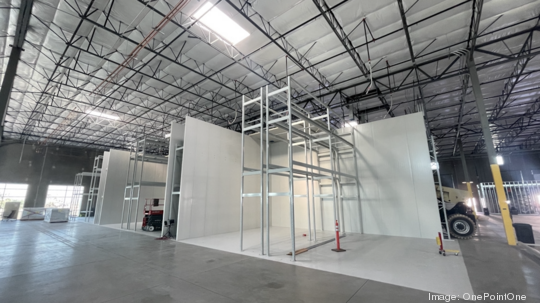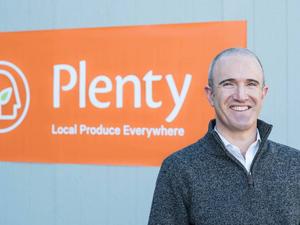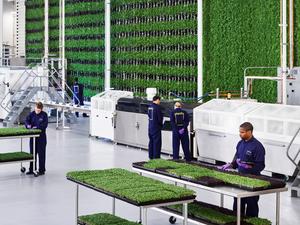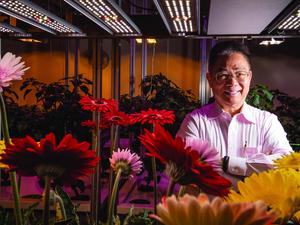
Vertical farming has been developing around the world and is seen as an alternative and sustainable way to farm while using less space and water, and now that technology is well on its way to the Phoenix market.
By early next year, an entrepreneur is opening the first phase of a technology-driven vertical farm inside an 80,000-square-foot warehouse in Avondale, a Phoenix suburb. It’s just the start of what his company hopes to change in agriculture.
Unlike traditional farms, San Jose-based OnePointOne Inc. uses plant science, vertical plane aeroponics systems, robots and artificial intelligence to grow food plants more efficiently indoors, according to the company.
One of the main goals of the facility is to be the “platform of production for agriculture,” through which food service companies and other businesses could purchase and virtually operate, according to co-founder and chief executive Sam Bertram, who was recently named as one of several Arizona residents in the Forbes 30 under 30 list for social impact.
“In other words, we don’t mind what crop you grow, where you grow it and what industry you’re in, we want to be that ‘Intel Inside.' We want to grow the product,” he told the Business Journal. “If Whole Foods wants 60,000 4-ounce packages of spring mix a month — [they could] buy a farm.”
Next year, the Avondale facility will also serve as a production hub for the company’s affiliate operation, a personalized vertical farming service called Willo. This direct-to-consumer brand allows individual members to order items such as salads from the indoor farm through a mobile application.
Three phases of development
The facility will be developed in three phases and is being financed through investors, according to OnePointOne. Future facilities will be financed through companies purchasing farms, but Bertram said OnePointOne is likely to go public in the next three years.
OnePointOne currently operates a 6,000-square-foot production and research and development facility in San Jose and has about 80 employees. It also partnered with California Giant Berry Farms to increase berry output and grow crops closer to consumers, the company announced this summer.
The new vertical farm comes as more food innovation centers are being developed in the Phoenix metro, where more businesses are looking at ways to help residents eat more sustainably. Some of the upcoming developments around food innovation could also place Arizona on the map as a hub for food distribution.

After starting the company in 2017, Bertram decided to fully lease the Avondale building, located at 855 N. 107th Ave., for its largest facility outside of the Golden State, which is expected to bring 70 jobs.
In the first phase, the 28-foot tall, two-story building could develop hundreds of thousands of plants per month out of thousands of vertical boards in six cultivation chambers, while production is expected to increase by six times over 18 months. The plant is fed through what's known as aeroponics, Bertram said.
“Outdoors, the plants sink its roots into soil and tries and find those pockets of nutrients, oxygen and water. In hydroponics, the roots drink from a pool of water,” he said. “Aeroponics is where we spray a mist. These droplets are tiny and arrive on the root, the root absorbs the water and the nutrients within and then pushes those nutrients out to the leaf.”
The aeroponics replaces soil, while LED lights provide photosynthetic energy for the plants. Any water that isn’t absorbed by the roots are recirculated to the plants. “That’s why we can be much, much more efficient with water,” said Bertram, who has a background in mechanical engineering and robotics.
'Perfect temperature' for plants
For example, if an organization wanted to grow Genovese basil from the Genoa, Italy region in a specific way, “if I try to do that outside, I’m at the whims of Arizona climate. Here we can control everything,” he said, adding that the technology can create the “perfect temperature” for the plants.
Through the six cultivation chambers, the Avondale facility will be comprised of six different temperature chambers, nutrient concentrations and light levels to “perfect the plant,” Bertram said. The facility will produce about 16 to 20 different kinds of crops for different customers.
To automate and clean the facility, OnePointOne will use fleet robotics, “so running around the top of the farm are many of these robots that perform the functions that human beings would otherwise perform,” he said.
This includes movement of plants and lights, inspection of plants, cleaning the infrastructure and taking images of the plants, which AI analyzes to improve farm operations. In total, the Avondale facility will have more than 10 robots, the company said.
“This farm will have a very specific plan about when we’re seeding the product, moving the product, harvesting the product, and these robots will perform autonomously according to the plan,” Bertram said.
The company said it uses 99% less land and water than traditional agriculture and that the process is fully free of pesticides, herbicides and any harmful chemicals. Bertram declined to share how much power and water the facility will use, but said the facility will consume a “significant” amount of electricity.
Why Avondale?
Bertram said OnePointOne did a city search for parameters including labor, construction and electrical costs. They created a shortlist and spoke to a number of cities throughout the process.
“Once we sort of discovered Avondale, we couldn’t believe how closely they worked with us, how quickly they processed permitting,” Bertram recalled. “Back in California, things were a lot more difficult oftentimes, and coming here was just a bloody breath of fresh air.”
In addition to meeting their parameters, Bertram said they wanted to test the facility's operations in 110-degree days. The first phase of the Avondale facility, which is comprised of 20,000 square feet, will be the company’s “model home.”
“When Amazon or Walmart or whomever come through here, we can tell them, ‘It produces X amount of product per month per y costs … here are the economics of the facility,’” he said. “Then they would make the decision, ‘OK we want to buy a facility, we'll finance the facility,’ and we’ll put it next to distribution centers to make sure Amazon Prime customers have access to one,” he said.
The remaining 60,000 square feet of the facility will be built out with farms purchased by companies like the "Amazons of the world," he said. The goal is to build farms close to facilities in the final stages of distribution.
By mid-2022, Bertram said members of Willo will also be able to receive plants from the Avondale facility, while the full buildout is expected to be completed by mid-2023.
"The number of customers, members, whether they're businesses or individuals, in Phoenix will be much greater than anywhere else in the United States. The Phoenix area will benefit the most from us being here. We'll be shipping to other places of course as well, but we love so many things about Arizona and this Avondale, West Valley area ... we're going to be here for a while," Bertram said.
Sam Bertram and his brother, John Bertram, co-founder of the company, first moved to the U.S. from Australia to play tennis, but founded OnePointOne with the goal to help feed people who are malnourished.
Sam Bertram recently moved his family to Scottsdale after visiting the area four months ago because he was ready for a change, but the company's headquarters will remain in California for now.
“I had no idea that Scottsdale had 10 different things that my three-year-old can do within five minutes. We didn’t move here to stay here for a year, we’re here for good,” he said.








